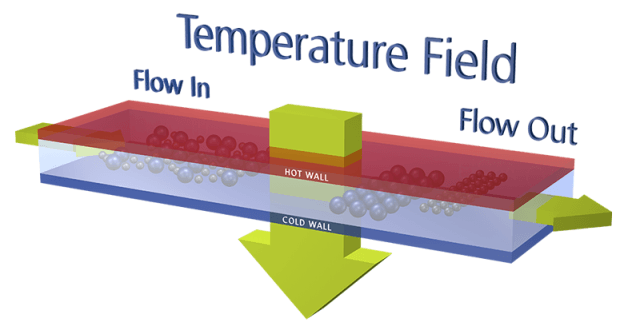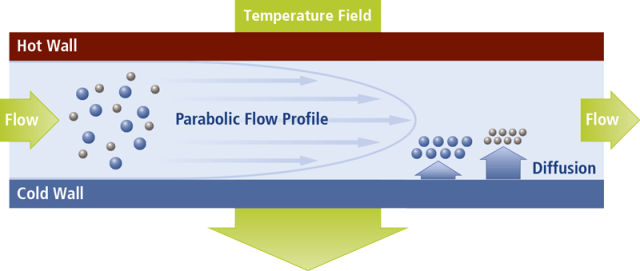The latest award winning Postnova TF2000 Thermal FFF Series was designed with the vision to become the first professional modular Thermal FFF system on the market. It is fully integrated with the NovaFFF single software platform, which operates the whole system from detectors to autosampler. The TF2000 Series combines expertise and proven technologies spanning three decades of leadership in FFF.
The TF2000 Thermal FFF system with its unique design, offers better flexibility, higher robustness, and enhanced performance compared to traditional chromatographic systems.
A separation column with stationary phase is no longer required, and as a result the TF2000 technology sets a totally new standard and offers a real alternative to column-based polymer characterization methods.
Broad Separation Range
The TF2000 system has a broad separation range and can divide small and large molar masses with high resolution. This allows a number of polymers to be separated, such as polystyrenes, starches, synthetic, polymethylmetacrylates, natural rubbers and other elastomers.
In contrast to traditional chromatographyic separation methods such as GPC/SEC, sample treatment is not required as the samples can be injected without filtration. This allows the characterization of complex polymer samples without any potential damage and alteration.
Thermal FFF does not have size exclusion limit, so even ultra-high molar mass, cross-linked, and branched polymers as well as gels, particles, and aggregates can be separated.
Molar Mass and Composition Separation
The TF2000 Series system is based on the Thermal FFF principle, and uses a temperature gradient as the driving force for the separation. Polymers impacted by this field display thermal diffusion, allowing the separation by both the chemical composition and molar mass.
This unique attribute allows the separation of diverse polymer material with the same molar mass. The separation can be further improved using different eluents and many temperature programs. The TF2000 is deal to seperate complex polymer samples in the area of adhesives, petrochemical, polymers, rubbers, and nanomaterials.
Advanced Thermal FFF Detection
To provide the user with full access to the wide application range the TF2000 Thermal is offered with a number of add-on modules and special FFF detectors, such as multi-angle light scattering (MALS), refractive index (RI), and dynamic light scattering (DLS).
All Postnova FFF modules and FFF detectors have been specifically designed for FFF and improved for use with the TF2000 Thermal FFF as well as for the other Postnova FFF versions. The TF2000 Series can be easily interfaced with current high-end detection technologies from top instrument suppliers, so that the user can combine the Postnova FFF technology into the current laboratory infrastructure to maximize investment and efficiency.


Download the Brochure for More Information
Key Features and Benefits
Separation of Polymers, Particles and Gels
The TF200 allows the concurrent separation, characterization and fractionation of polymers, particles, and gels within a single measurement. The channel is reusable and only needs to be cleaned occasionally. No consumable has to be replaced frequently.
Wide Separation Range
Other than chromatography, the separation in Thermal FFF can also be conducted for polymers from 1 kDa up to molar masses of 10E9 and more Da. Size exclusion effect is not noticed, making the TF2000 an ideal tool for the separation of ultra-large and large cross-linked polymers.
Gentle Separation Conditions
Due to the open channel and no stationary phase existing, it is possible to carry out the separation under in the absence of stress and shear forces to the macromolecule. Standard chromatography problems can be avoided, such as shear induced chain degradation, adsorption/filtering effects, and late elution effects.
Wide Range of Eluents
As the stationary phase is not present, almost any type of organic and even certain aqueous liquids can be utilized in thermal FFF. Only the thermal diffusion characteristics of the polymers under investigation need to be adequately robust in the given eluent.
This enables aggressive and otherwise hard to use eluents to be used easily, such as DMSO for starch analysis. Adding salt is not required, such as LiBr, which is frequently needed in chromatography to prevent the polymer from interacting with stationary phases.
R&D and QC Capability
As the TF2000 does not use membrane at all, and it is an extremely strong and simple to use device, it is easy to employ as a regular tool for QC analysis 24/7 directly coupled into the chemical manufacturing processes. It is possible to control the TF2000 remotely.
It meets and conforms to strict international security regulations, and provides a number of automatic security features to allow unattended usage. Pressure, gas, temperature, and leak sensors are continuously monitoring the system for reproducibly and steady operation even in challenging production environments.
Flexibility and Interfaceability
The TF2000 series is designed to operate as a stand-alone system or interfaced with current chromatographic systems from a number of manufacturers. This offers the advantage that FFF and GPC/LC can be conducted using the same set or detectors, providing 2D data.
Download the Brochure for More Information